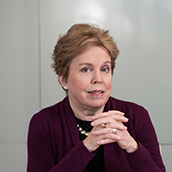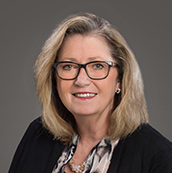Transitioning to Meet Changing Needs and Demands
An interview with Enbridge’s Chief Sustainability Officer Linda Coady and Roxanna Benoit, Vice President, Responsible for Indigenous & Stakeholder Relations, on Enbridge’s 2017 Corporate Sustainability Report and the Company’s future direction when it comes to disclosure and engagement on its policies, approach and performance on environmental, social and governance matters.
This is Enbridge’s first corporate sustainability report since your 2017 merger with Spectra Energy. Can you comment on the experience of integrating sustainability performance data of two large companies?
Coady: To be sure, the process has not been without its challenges. With that said, we’ve benefited from significant advantages, including the expertise of our people and lengthy history of sustainability performance data management and reporting within both legacy organizations.
Work is still underway on the integration of IT-based platforms used for data collection to create efficiencies, ensure data consistency and quality, and enhance functionality across the company. This also includes a third party-led data assurance readiness exercise for the GHG emission and energy consumption data.
Benoit: After the close of the merger transaction with Spectra Energy in early 2017, we initiated an internal review of the two companies’ respective policies and practices to ensure consistency in how we approach issues such as Indigenous rights, stakeholder engagement and climate change. This will help us to continue to harmonize the collection, management and reporting of key performance indicators and sustainability data.
The sustainability reporting landscape is undergoing a number of significant changes, including the emergence of new reporting frameworks and an ever-expanding array of environmental, social and governance metrics and evaluators. How is your reporting strategy changing to deal with these developments and demands?
Coady: The demand for transparency on metrics related to corporate responsibility and sustainability is certainly growing. But what remains constant for us is the imperative to ensure we’re focused on the information that matters to the stakeholders and decision makers that are of greatest relevance to our business. As a result, in addition to our annual sustainability report, this year we are also releasing two more focused reports—one on how we are approaching Indigenous rights and relationships in North American energy infrastructure, and one that begins to align our reporting on climate issues with the framework set out by the G20 Financial Stability Board’s Task Force on Climate-Related Financial Disclosure (TCFD).
Benoit: At the same time, we’re sharpening our focus on the frameworks and metrics that are most frequently used and valued by our stakeholders—to better enable disclosure of quality data over quantity of information. We’ve heard from our stakeholders that consistency and comparability of data over time is a key priority—and we agree. Through our participation in industry and sustainability forums, we’re contributing to efforts to harmonize and consolidate different reporting frameworks, both existing and emerging, and advance more meaningful and efficient disclosure on environmental, social and governance factors.
What are some of the new elements in your 2017 report that readers should be looking for?
Coady: The most significant change is in how we deliver it. Our sustainability reporting contains a lot of information. To help make the content more accessible and to make it easier for readers to find what they’re looking for, we’re taking an “online first” approach. Our new, interactive website offers readers the ability to move through sections at their own speed—and as they go, they’ll be able to highlight relevant content, annotate it and save their own personal version for later reference. Built-in functionality also enables readers to share content directly through their social media platforms.
Benoit: Our new integrated online platform also enables us to bring all of our reporting together – this annual sustainability report along with our annual Safety Report to the Community and our other enhanced disclosures.
As the person responsible for Indigenous engagement at Enbridge I am looking forward to feedback on our discussion paper on Indigenous Rights and Relationships. We’re also pleased this year to be able to include third-party perspectives in our sustainability report through a series of ‘Conversations’ with external stakeholders engaged with our company on various initiatives—from emergency response to environmental stewardship.








